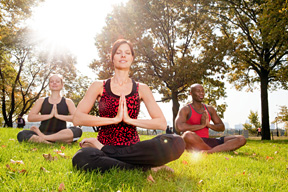Stress Reduction: Key to Our Overall Wellbeing
By Julie T. Chen, MD
Stress is something we all deal with on a daily basis to some varying degree. Some of us deal with a significantly higher level from hour to hour than most. What's unfortunate about that is that the source of the stress may be out of our control but its negative impact on our body, we have to deal with on a daily basis as well.
So, how can we take back control our own physiology when we're not even the ones potentially causing the stress on ourselves?
The key is to intentionally implement relaxation into your day and to use factors in your life that you can control to help you combat the negative effects of long term stress. The sheer act of empowering yourself to take back control of your own life and body has a positive effect all on its own. So, let's get started!
Just Breathe
Breath work is something you can do patients for stress management rather discreetly even on public transit or in your work cubicle. There are many versions of breath work but one of the simplest is to just double your exhalation time compared to your inhalation time.
So, you can inhale slowly for a count of 4 or 5 and exhale slowly over a count of 8 or 10. By doing this for a few cycles, you can notice that your mind calms and your heart rate slows down. If you are able to do this at least a couple times a day, you'll be able to keep your overall daily stress level to a more manageable state. You may want to incorporate calming scents or music or imagery to this exercise to further augment the effectiveness of your relaxation time by utilizing multiple senses at once.
Keep Active
 Other possibilities for relaxation activities would include, but are not limited to, journaling, self-hypnosis or imagery, meditation, walking in nature, tai chi, qi gong, yoga, relaxing baths or play time with your pet. Studies show that by implementing these types of activities, overall wellness and health can be improved along with your mood and quality of sleep or management of some medical conditions such as chronic pain.
Other possibilities for relaxation activities would include, but are not limited to, journaling, self-hypnosis or imagery, meditation, walking in nature, tai chi, qi gong, yoga, relaxing baths or play time with your pet. Studies show that by implementing these types of activities, overall wellness and health can be improved along with your mood and quality of sleep or management of some medical conditions such as chronic pain.
Now that you've got a few starting ideas to help you regain control over your stress level, let's talk about some things you can do to try to combat the effects of long-term stress. Our foods have a huge impact on our overall health and inflammatory state. By opting to limit processed foods, drinking adequate water daily, and eating anti-inflammatory, you will be able to try to optimize your body's physiology so that it is more resistant to the negative effects of stress.
Sleep and exercise are also two very important factors that, if approached consistently in a healthy manner, can help our body be more resilient against health hazards such as chronic stress in our life. One thing that we do know in medicine is that chronic stress over time has an overall negative impact on our mood, inflammatory state, metabolism, body weight, and propensity towards chronic diseases.
So, let's take the steps now to combat the impact of stress and not wait until we start to see these negative effects come to fruition in our body. Here are five steps to help you try to reduce stress and its impacts on your health:
- Implement breath work at least three times a day on a regular basis.
- Consider journaling or any of the above mentioned activities as a way to establish a regular stress reduction routine and do them a few days a week, if not daily.
- Focus on eating an anti-inflammatory diet to help your body be more efficient in fighting off the negative effects of chronic stress.
- Aim for at least 7-8 hours of sleep every night if possible.
- Get in regular exercise to help with stress management and to optimize your body's overall health.
Talk to your chiropractor for more tips on combating stress in your daily life.
Dr. Julie T. Chen is board-certified in internal medicine and fellowship-trained and board-certified in integrative medicine. She has her own medical practice in San Jose, Calif. She is the medical director of corporation wellness at several Silicon Valley-based corporations, is on several medical expert panels of Web sites and nonprofit organizations, is a recurring monthly columnist for several national magazines, and has been featured in radio, newspaper, and magazine interviews. She incorporates various healing modalities into her practice including, but is not limited to, medical acupuncture, Chinese scalp acupuncture, clinical hypnotherapy, strain-counterstrain osteopathic manipulations, and biofeedback. To learn more, visit www.makinghealthyez.com.

